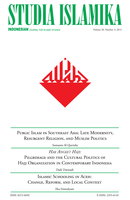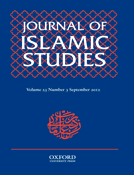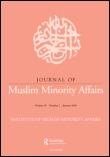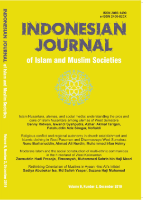
Studia Islamika
Scope & Guideline
Pioneering research in the realm of Islamic studies.
Introduction
Aims and Scopes
- Islamic Thought and Intellectual Heritage:
The journal focuses on the preservation and evolution of Islamic thought, particularly examining historical figures and their contributions to Islamic scholarship. - Islam and Politics:
A significant area of research involves the interplay between Islam and political dynamics in Southeast Asia, including the role of religious institutions and movements in shaping political landscapes. - Social Issues and Islamic Law:
The journal investigates contemporary social issues through the lens of Islamic law, exploring how legal frameworks interact with societal norms and challenges. - Cultural Expressions of Islam:
Studia Islamika emphasizes the cultural dimensions of Islam, analyzing how religious narratives manifest in various forms of media, art, and community practices. - Interfaith Relations and Social Integration:
The journal also addresses the complexities of interfaith relations and the integration of Muslim communities within diverse cultural contexts.
Trending and Emerging
- Health and Religion during Crises:
The journal has seen a rise in articles addressing the intersections of health crises, such as the COVID-19 pandemic, and religious responses, highlighting the role of fatwas and religious authority in public health. - Environmental Issues and Islamic Perspectives:
There is an emerging trend focusing on ecological movements within Islam, examining how religious frameworks can contribute to environmental sustainability and advocacy. - Cultural Identity and Modernity:
The exploration of cultural identity in the context of modernity is gaining traction, particularly in how traditional practices adapt to contemporary societal challenges. - Youth Engagement and Activism:
Research on the roles of youth in Islamic movements and their engagement in social activism is increasingly prominent, reflecting a generational shift in religious participation. - Gender and Islamic Discourse:
The journal is also witnessing a growing interest in gender studies within Islamic contexts, exploring the roles and representations of women in religious and social spheres.
Declining or Waning
- Traditional Islamic Education:
Research on conventional Islamic educational systems, such as pesantren, has seen a decline as newer educational paradigms and innovative practices gain attention. - Historical Islamic Figures:
There appears to be a waning focus on the study of specific historical Islamic figures, as contemporary issues and movements increasingly dominate the discourse. - Islamic Extremism and Security:
Although still relevant, the focus on Islamic extremism and security issues has diminished, as the journal pivots towards exploring broader social and political themes. - Islamic Art and Aesthetics:
The exploration of Islamic art and aesthetics has decreased in favor of more pressing socio-political and legal discussions in contemporary Islamic contexts.
Similar Journals

Journal of Islamic Studies
Illuminating the Depths of Islamic ScholarshipJournal of Islamic Studies, published by Oxford University Press, serves as a pivotal platform for the dissemination of research in the dynamic fields of Islamic culture, history, and literature. With an ISSN of 0955-2340 and an E-ISSN of 1471-6917, this esteemed journal has established itself within the upper echelons of academic scholarship, holding a Q1 ranking in Cultural Studies, History, Literature and Literary Theory, and Religious Studies as of 2023. Its distinguished standing among peers is further evidenced by Scopus rankings that place it within the 97th percentile for Literature and Literary Theory and the 91st percentile for both Religious Studies and History. Aimed at researchers, professionals, and students alike, the journal spans a broad temporal focus from 1990 to 1996 and continues from 2009 to 2024, nurturing vital discourse on Islamic studies without the barrier of open access. With its rich repository of articles, the Journal of Islamic Studies remains an essential source for advancing understanding and scholarship in a rapidly evolving academic landscape.

Journal of Muslim Minority Affairs
Connecting Research with Real-World ChallengesJournal of Muslim Minority Affairs, published by Routledge Journals, Taylor & Francis Ltd, stands as a pivotal platform in the realm of interdisciplinary research focusing on Muslim minority communities worldwide. With an ISSN of 1360-2004 and an E-ISSN of 1469-9591, this journal aims to explore critical issues of identity, cultural integration, and socio-political dynamics affecting these communities. It boasts a commendable impact factor and is strategically positioned within various academic quartiles: Q3 in Anthropology and Sociology and Political Science, alongside Q2 in Cultural Studies, demonstrating its comprehensive engagement in these fields. Researchers and practitioners can access a wealth of qualitative and quantitative studies, enhancing understanding and awareness of minority rights, cultural expressions, and political representation. With historical convergence from 1996 and a breadth of subjects relevant to today’s global discussions, the Journal of Muslim Minority Affairs is essential for scholars, professionals, and students interested in the complexities surrounding Muslim minorities.

International Journal of Islamic Thought
Connecting Local Insights with Global Perspectives in Islamic ThoughtInternational Journal of Islamic Thought is a leading scholarly publication, dedicated to advancing knowledge and understanding in the fields of Islamic studies. Published by UNIV KEBANGSAAN MALAYSIA, FAC SCIENCE & TECHNOLOGY, this journal is positioned as an essential resource for researchers, professionals, and students alike, striving to explore and disseminate contemporary thoughts and interpretations within the Islamic intellectual tradition. With an impact factor indicative of its quality—ranking Q2 in Arts and Humanities and Q3 in Social Sciences as of 2023—the journal provides a robust platform for interdisciplinary discourse. Since its inception, the journal has embraced an open access model, ensuring that research is readily available to a global audience, thereby fostering further inquiry and collaboration. Hailing from Malaysia, the journal's commitment to contributing to both the local and international scholarly communities is underscored by its impressive standing in the Scopus rankings, reflecting its growing influence and reach in the academic landscape.

Journal of College of Sharia and Islamic Studies
Elevating Academic Excellence in Sharia and Islamic StudiesThe Journal of College of Sharia and Islamic Studies, published by Qatar University, College of Sharia & Islamic Studies, is a premier academic platform dedicated to advancing the understanding and scholarly discourse in the field of Islamic studies and Sharia law. With an ISSN of 2305-5545 and an E-ISSN of 2523-1715, this open-access journal has been freely available since 2005, promoting accessibility to high-quality research for a global audience. Situated in Doha, Qatar, the journal serves as a pivotal resource for researchers, professionals, and students who seek to explore the complexities of Islamic jurisprudence, ethics, and philosophy. The journal's commitment to promoting rigorous scholarship is evidenced through its diverse articles, which not only address classical and contemporary issues in Islamic studies but also engage with interdisciplinary perspectives. As an essential resource within the academic community, it aims to foster dialogue and collaboration among scholars worldwide.

Journal of Al-Tamaddun
Illuminating the Rich Tapestry of Al-TamaddunWelcome to the Journal of Al-Tamaddun, an esteemed academic publication dedicated to the exploration of Islamic history, culture, and anthropology. Published by UNIV MALAYA, ACAD ISLAMIC STUDIES, this open-access journal has been contributing to scholarly discourse since 2008, allowing comprehensive and unrestricted access to its rich array of research articles. The journal proudly ranks in the upper quartiles of several categories for 2023, including Q1 in History and Religious Studies and Q2 in Anthropology and Cultural Studies, reflecting its significant impact and relevance in these fields. Hailing from Malaysia, the journal serves as a global platform for researchers and scholars, fostering interdisciplinary dialogue and enhancing our understanding of civilization through a critical Islamic perspective. With its Scopus rankings highlighting its standing within arts and humanities, the Journal of Al-Tamaddun aims to propel innovative research and contribute to the development of knowledge across diverse academic landscapes.

Intellectual Discourse
Empowering Scholars with Cutting-Edge ResearchIntellectual Discourse is a distinguished academic journal published by the International Islamic University Malaysia's Press Research Management Center. This journal, with an ISSN of 0128-4878 and E-ISSN of 2289-5639, serves as a vital platform for scholarly work in the fields of Philosophy, Sociology, and Political Science. Since its inception in 2011, it has strived to foster a multidisciplinary dialogue, blending theoretical insights with empirical research. Ranked Q2 in Philosophy and Q3 in Sociology and Political Science as of 2023, Intellectual Discourse is committed to advancing knowledge and understanding through rigorous analysis and innovative perspectives. Researchers and scholars can access its insightful publications to stay abreast of current trends and discussions that shape their fields. With an ongoing commitment to intellectual rigor, the journal positions itself as an essential resource for academics and students aiming to explore complex social phenomena and philosophical inquiries.

Contemporary Islam-Dynamics of Muslim Life
Unveiling Contemporary Dynamics in IslamContemporary Islam: Dynamics of Muslim Life, a distinguished journal published by SPRINGER, serves as a vital platform for scholarly discourse in the fields of Cultural Studies and Religious Studies, where it proudly holds a Q1 ranking in both categories as of 2023. With an impressive impact factor that reflects its robust academic contributions, the journal is positioned within the 94th percentile in Religious Studies and the 86th percentile in Cultural Studies on Scopus, highlighting its relevance and influence in contemporary research. Access to its cutting-edge articles, rigorously peer-reviewed, is vital for researchers, professionals, and students seeking to comprehend the multifaceted dynamics of Muslim life across various contexts. Established in 2007 and continuing through 2024, this journal not only provides invaluable insights into Muslim communities but also addresses broader social and cultural phenomena, making it an essential resource for anyone interested in understanding the contemporary Islamic landscape.

Indonesian Journal of Islam and Muslim Societies
Illuminating insights into Muslim societies and their dynamics.Indonesian Journal of Islam and Muslim Societies (IJIMS) is a leading platform for scholarly discourse in the fields of Islamic studies and social sciences, published by INST AGAMA ISLAM NEGERI-IAIN SALATIGA. Since its establishment in 2011, IJIMS has been dedicated to advancing the understanding of Islamic culture, society, and politics, with an impressive impact reflected in its Q1 ranking in Religious Studies and Q2 in Sociology and Political Science as of 2023. The journal not only ranks among the top in the Scopus database, occupying the 19th position in the Arts and Humanities—Religious Studies category, but it also offers open access to its content, making it readily available to a global audience. This commitment to accessibility ensures that researchers, students, and professionals can engage with high-quality research that informs and shapes contemporary dialogue on Islam and Muslim societies. With a convergence of rich academic contributions through to 2024, IJIMS stands as a vital resource for those looking to explore the complexities of Islam in a modern context.

Sirnak University Journal of Divinity Faculty
Advancing Theological Discourse for a Global AudienceWelcome to the Sirnak University Journal of Divinity Faculty, a premier open-access journal dedicated to the exploration of diverse theological, philosophical, and cultural issues within the realm of religious studies. Published by Sirnak University, this journal has been freely accessible since 2010, ensuring that scholars, professionals, and students can engage with high-quality research without barriers. With an emphasis on interdisciplinary approaches and innovative perspectives, the Sirnak University Journal of Divinity Faculty aims to foster academic discourse and contribute to the broader understanding of divinity and related disciplines. Though the journal is relatively new, it strives to establish a significant presence in the field by welcoming original research articles, reviews, and theological reflections from researchers worldwide. Join us in advancing the academic study of divinity and enriching the scholarly community.

Islamiyyat-The International Journal of Islamic Studies
Bridging cultures through rigorous Islamic research.Islamiyyat-The International Journal of Islamic Studies is a prominent academic platform dedicated to advancing the scholarship of Islamic studies. Published by Penerbit Universiti Kebangsaan Malaysia, the journal emphasizes the significance of Islamic thought and practices within various cultural and sociopolitical contexts, fostering dialogue and understanding across disciplines. While it operates under an open access model, it remains committed to publishing high-quality, peer-reviewed research that addresses contemporary issues in Islamic studies, making it an essential resource for researchers, professionals, and students alike. This journal aspires to contribute meaningfully to the field by encouraging a diverse range of scholarly perspectives, thereby enhancing the global discourse surrounding Islam and its multifaceted narratives. For additional insights, submissions, and updates about upcoming issues, interested individuals are encouraged to visit the journal's webpage at Penerbit Universiti Kebangsaan Malaysia.